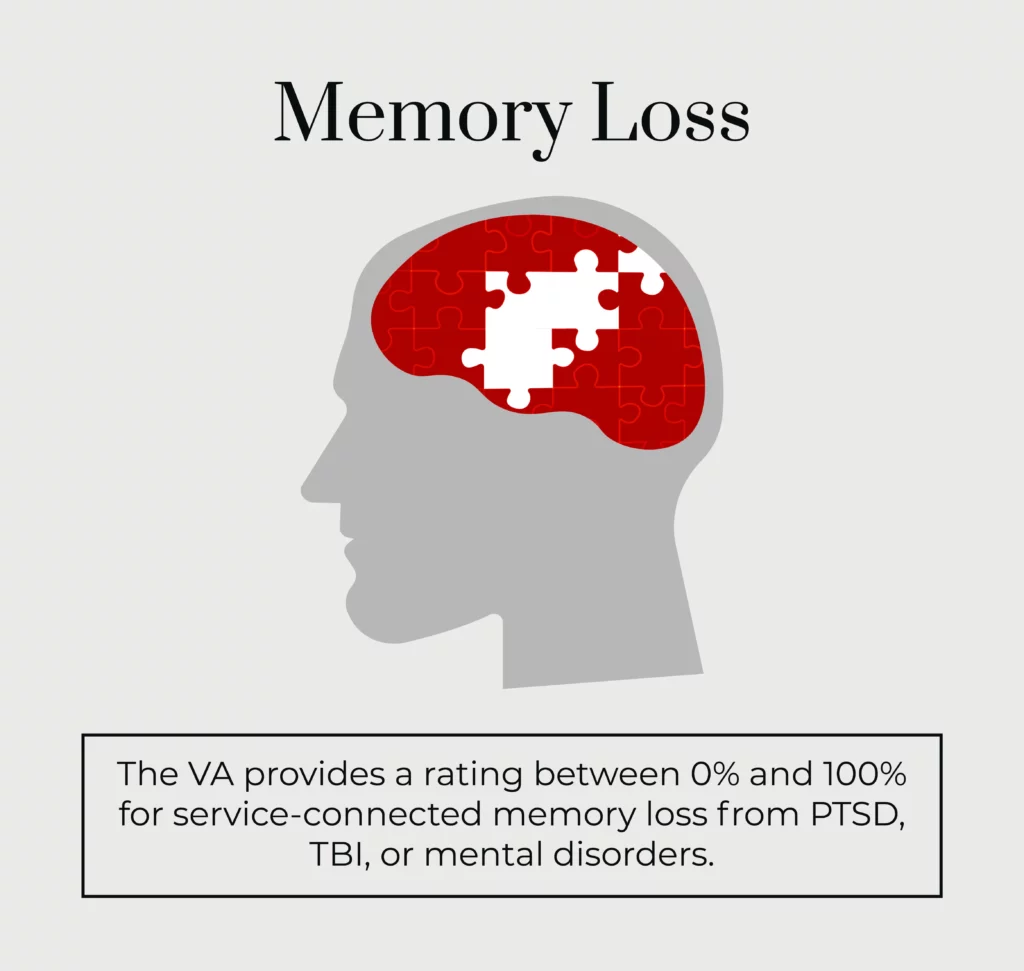The U.S. Department of Veterans Affairs (the VA) can provide you with benefits, including monthly compensation, if you qualify as a veteran disabled by memory loss. The VA rates memory loss between 0% and 100%.If you want to obtain a VA rating for memory loss, please call Stone Rose Law at (480) 498-8998 or use our contact form for help.

The VA assigns a percentage-based VA disability rating for veterans with a service-connected memory loss condition. This percentage level can be from 0% to 100%.
Unlike many other disabilities, the VA does not have a diagnostic code that it assigns specifically to memory loss. Instead, the disability rating you receive is based on how your memory loss condition originated.
For example, if you are diagnosed with post-traumatic stress disorder (PTSD), then the VA recognizes PTSD as a compensable disability. Your memory loss symptoms connected with PTSD can increase your PTSD disability rating because they increase the severity of that condition.
Other disability conditions that can contribute to memory loss include traumatic brain injuries (TBI) and mental disorders like Alzheimer’s disease and dementia.
Because memory loss is a contributing factor to other disabilities instead of a disability in its own right, your VA rating associated with memory loss will be tied to the underlying disability causing it.
If your memory loss arises from PTSD, then the VA rates PTSD disability at any of 0%, 10%, 30%, 50%, 70%, or 100%, depending on how severe your symptoms are, how often they occur, and how long they last.
If your memory loss is connected with a traumatic brain injury, then your disability rating can be 0%, 10%, 40%, 70%, or 100%. A severe TBI-related disability can also qualify you for special monthly compensation.
If your memory loss is related to an underlying mental disorder, then your disability rating can be 0%, 10%, 30%, 50%, 70%, or 100%.
| VA Disability Rating | Common Symptoms |
|---|---|
| 0% |
|
| 10% |
|
| 30% |
|
| 50% |
|
| 70% |
|
| 100% |
|
Even if your memory-loss related disability condition does not by itself qualify you for a 100% disability rating, you may still be able to receive total disability compensation through TDIU.
To qualify for schedular TDIU benefits, you must be unable to keep substantially gainful employment and meet one of the following conditions:
If you cannot qualify for schedular TDIU, in some circumstances the VA may still consider you eligible in an extra-schedular capacity based on an unusual or exceptional disability.
To receive VA disability benefits for a memory loss disability condition, you must file a claim with the VA using VA Form 21-526EZ. With this form, along with additional supporting documentation, you must convince the VA that:
To support your claim, you will need to have documentation evidence to establish a service connection. This documentation can include any of the following:
To support your claim for memory loss-related VA benefits, you will likely need to undergo memory loss testing. The purpose of this test is to establish the extent of your memory loss condition so the VA can assess its impact on your underlying disability.
Specifically, memory loss testing evaluates:
Memory loss testing usually includes the following parts:
Cognitive testing can include a brief memory test, including testing your long-term memory by comparing your test answers to someone else close to you, like your spouse or another close relative.
If the results of your memory loss testing suggest that more detailed testing is needed for cognitive problems, then you may be referred to a specialist like a neurologist for additional examinations like brain imaging or brain scans before the VA will make its final decision.
The VA does not always approve benefits claims the first time it considers them. The reasons for denial can vary. For example:
In some cases, the VA itself might make a mistake when processing your claim.
If your claim is denied, then you have options to seek a review of your claim. These include:
At Stone Rose Law, our veterans lawyers provide highly professional legal representation to military veterans.
A Stone Rose VA disability lawyer can help you prepare your disability claim, monitor your claim status and consult with you before disability examinations, at no cost to you.
If the VA denies your original claim, then our VA benefits law firm will assign a VA disability appeals lawyer to help you pursue a VA appeal with the Board of Veterans Appeals while providing free representation on a contingency fee basis.
For more information about how one of our VA disability lawyers can help you with your VA disability compensation claim or appeal, request a free assistance consultation by calling (480) 498-8998 or using our contact form.